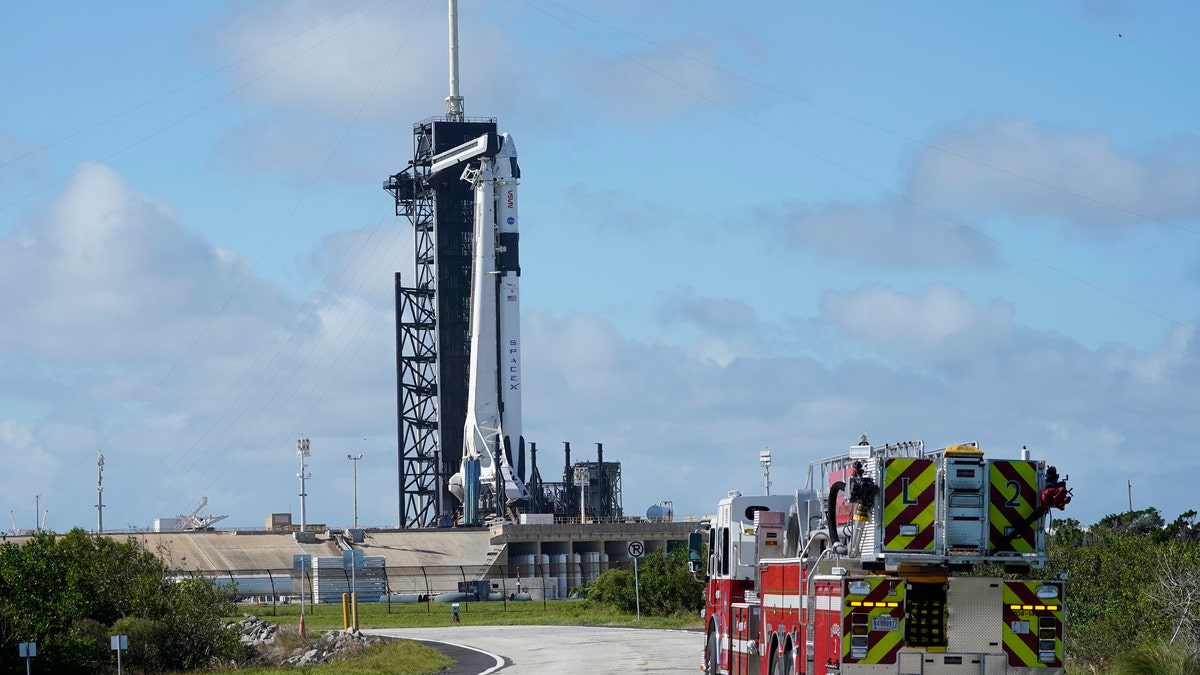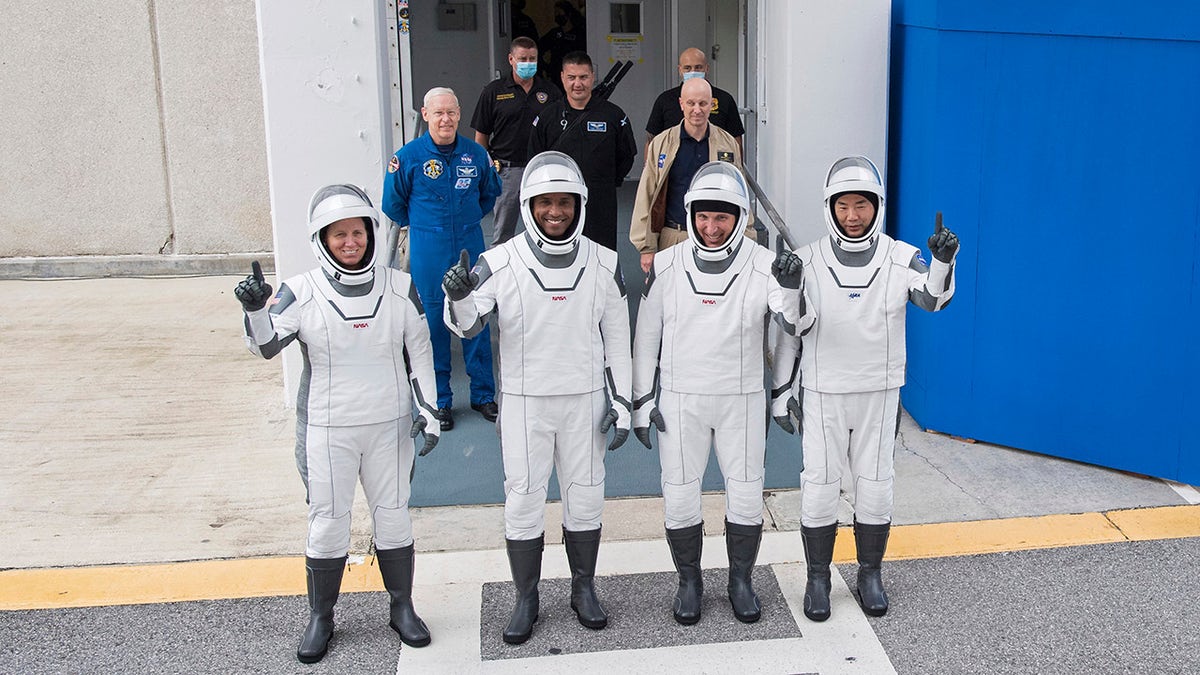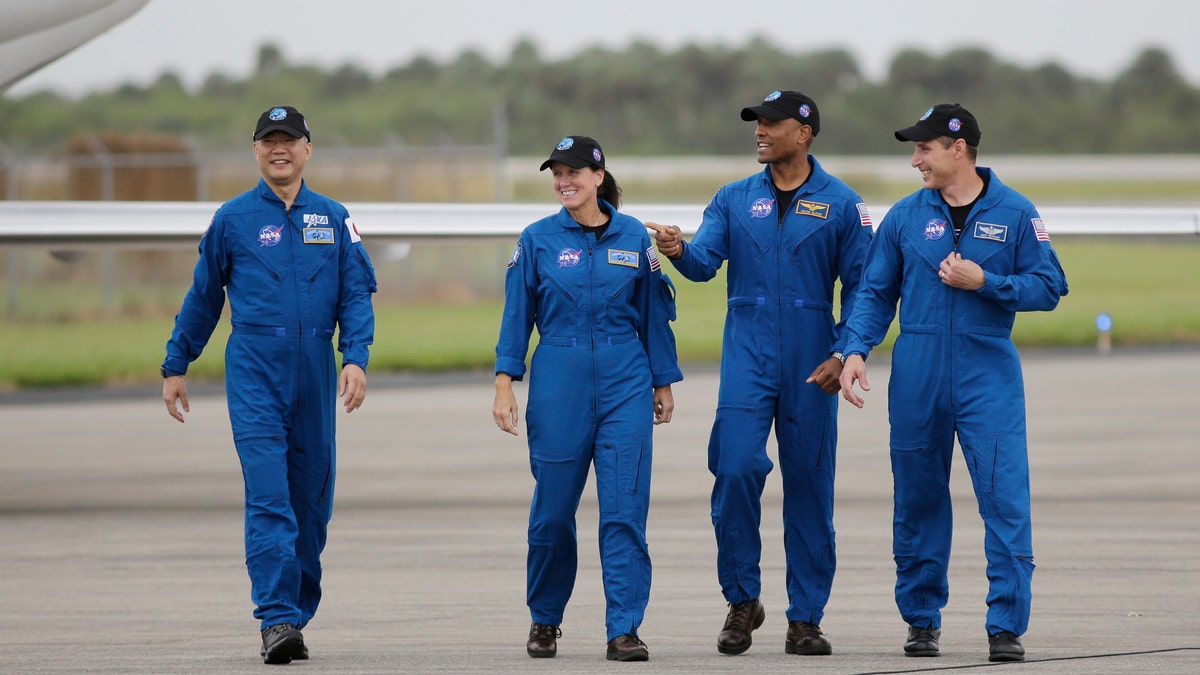Fox News Flash top headlines for November 15
Fox News Flash top headlines are here. Check out what's clicking on Foxnews.com.
NASA is set for the first operational SpaceX Crew Dragon launch, marking an important milestone for the space program.
The launch, which was pushed back from Saturday on account of weather, is scheduled for 7:27 p.m. ET Sunday from Launch Complex 39A at NASA’s Kennedy Space Center in Florida. The six-month mission is the first crew rotation flight on a U.S. commercial spacecraft.
The latest weather forecast is 50% favorable, NASA tweeted on Sunday morning.
“All systems are go for tonight’s launch at 7:27 p.m. EST of Crew Dragon’s first operational mission with four astronauts on board,” tweeted SpaceX.
"Monitoring onshore winds, but we are within margins and are still a go for launch," tweeted NASA Administrator Jim Bridenstine at 1:46 pm ET Sunday.

NASA firefighters drive on the road outside the fence near a SpaceX Falcon 9 rocket, with the company's Crew Dragon capsule attached, sits on the launch pad at Launch Complex 39A Friday, Nov. 13, 2020, at the Kennedy Space Center in Cape Canaveral, Fla. (AP Photo/Chris O'Meara)
The Crew-1 mission will bring NASA astronauts Mike Hopkins, Victor Glover and Shannon Walker and Japan Aerospace Exploration Agency astronaut Soichi Noguchi to the International Space Station aboard the Crew Dragon vehicle. It follows a successful Demo-2 mission earlier this year.
Vice President Mike Pence and Second Lady Karen Pence will attend the Crew-1 launch.
The launch was initially slated for Oct. 31 but was pushed back to Nov. 14 when the Falcon rocket had two engines replaced because of contamination from a red lacquer used in processing.
The astronauts have named their Dragon capsule Resilience given all the challenges of 2020: coronavirus and social isolation, protests against racial injustice, and a particularly difficult election and campaign season. They have been in quarantine for a week or two and were taking safety precautions — masks and social distancing — long before that.
NASA HAS CERTIFIED ELON MUSK'S SPACEX TO CARRY ASTRONAUTS, ENDING ITS RELIANCE ON RUSSIA
On the orbiting space lab, the Crew-1 team will join NASA astronaut Kate Rubins, who is already on the space station, in conducting extensive scientific research. “Not only will the Crew-1 astronauts and fellow Expedition 64 NASA astronaut Kate Rubins conduct hundreds of microgravity studies during their mission, they also deliver new science hardware and experiments carried to space with them inside Crew Dragon,” explained NASA in a statement.

NASA astronauts, from left, Shannon Walker, Victor Glover, Mike Hopkins and Japan Aerospace Exploration Agency (JAXA) astronaut Soichi Noguchi, right, wearing SpaceX spacesuits, stop to pose for a picture as walk out of the Neil A. Armstrong Operations and Checkout Building to depart for Launch Complex 39A during a dress rehearsal Thursday, Nov. 12, 2020, at NASA's Kennedy Space Center in Cape Canaveral, Fla. (Joel Kowsky/NASA via AP)
The astronauts will investigate food physiology, conduct a student-designed experiment on genes in space and grow radishes, as well as examine the interaction between microbes and rocks in microgravity.
Other experiments include using thumb drive-sized devices containing human cells to study the effects of space on human organs and a study on changes in cardiovascular cells and tissues in microgravity. Experiments will also be conducted on NASA’s next-generation spacesuit, the Exploration Extravehicular Mobility Unit (xEMU).
The mission marks another important milestone for America’s space program following the Demo-2 flight earlier this year.
NASA CHIEF SAYS HE DOES NOT PLAN TO SERVE IN BIDEN ADMINISTRATION
On Aug. 2, NASA astronauts Doug Hurley and Bob Behnken splashed down in the Gulf of Mexico in a SpaceX Crew Dragon spacecraft, ending their historic two-month trip to space.

Astronaut Soichi Noguchi, of Japan, from left, NASA Astronauts Shannon Walker, Victor Glover and Michael Hopkins walk after arriving at Kennedy Space Center, Sunday, Nov. 8, 2020, in Cape Canaveral, Fla. (AP Photo/Terry Renna)
The mission marked the first time that astronauts have launched from American soil since the final Space Shuttle flight in 2011. Amid a blaze of publicity, the Demo-2 mission lifted off from Kennedy Space Center atop a SpaceX Falcon 9 rocket on May 30.
After the end of the Space Shuttle program, the U.S. relied on Russian Soyuz rockets launched from the Baikonur Cosmodrome in Kazakhstan to get astronauts into space. Russia charges the U.S. about $75 million to send an astronaut into space, and the Associated Press reports that the last Soyuz ticket cost America $90 million.
CLICK HERE TO GET THE FOX NEWS APP
Fox News’ Chris Ciaccia, Kristin Fisher, Lauren Blanchard, David Clark, Erin McEwan and the Associated Press contributed to this article.










































